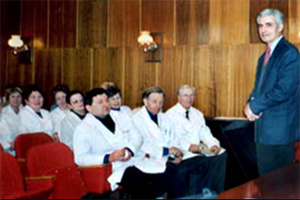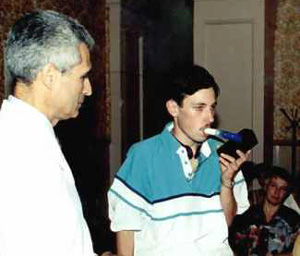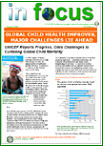|
Smoking-Cessation Program Motivates Russian Physicians To Assist Their Patients - and Themselves

Physician training in Russia is a critical step in curbing the country's deadly tobacco addiction
The smoking prevalence in Russia is one of the highest in the world: 63 percent of men and 12 percent of women in the country currently smoke, with more than 30 percent of total male deaths and 5 percent of total female deaths attributed to the habit. Even more surprising is that the smoking prevalence and corresponding death rates among Russian health professionals equal that of the general population. All told, 40 million Russians light up, and the numbers are increasing everyday. More than half of the current smokers say they want to kick the habit. But no national anti-smoking campaigns or programs are in force, and Russia did not sign the international Framework Convention on Tobacco Control. A Comprehensive, Critical Program 
Testing lung capacity in Russian antismoking clinic
There is a critical need for cost-effective, popular, available and applicable methods to encourage and train physicians in the Russian Federation to champion smoking cessation among patients. Currently, Russian physicians are one of the main barriers to tobacco control in the country. CECHE and the Russian Cancer Research Center answered the call to address, and ultimately reverse, this situation.
Five seminars and one course are being conducted per year. About 50 physicians participate in each seminar, and about 20 physicians with particular interest in tobacco control and methods for treating tobacco dependence and nicotine addiction participate in each course. A manual in 5000 copies will be published and disseminated throughout the medical community via seminars, courses and participating clinics. The ultimate goal of the project is to effect a drop in smoking prevalence and a corresponding rise in health benefits and life span in the Russian population. As Russians queue to quit, the partners plan to expand the program to other regions of the Russian Federation. A Preliminary Report To date, over 40 educational sessions have been conducted in 20 out-patient clinics and four hospitals in Moscow. In total, about 600 physicians took part in these sessions. Moreover training workshops have been conducted at the Russian Cancer Research Center and the Moscow Health Educational Center. Several hundred physicians took part in these workshops. To date, 20 educational sessions have been conducted in 16 out-patient clinics and four hospitals in Moscow. In total, about 600 physicians took part in these sessions. Moreover two one-day training workshops were conducted in 2002, on 19 April at the Russian Cancer Research Center and on 30 May at the Moscow Health Educational Center. About 90 physicians took part in these workshops. Preliminary data analysis from a survey of the first 300 health professionals who took part in educational sessions are available in the following PowerPoint presentations:
Preliminary survey and program data revealed that, while 66 percent of male doctors, 21 percent of female doctors and 34 percent of nurses are current or former smokers, only 42 percent of smoking health professionals want to quit (as opposed to 60 to 70 percent of current smokers in the general population). Sadly, a majority of surveyed health professionals cannot name specific health hazards associated with smoking. And more disappointing, only 34 percent of them said that they would like to participate in a workshop on tobacco and health problems, and methods of tobacco dependence treatment.
Although 52% of health professionals answered that they always advised their smoking patient to quit smoking, these data are questionable because surveys of patients in Moscow out-patient clinics show that less than 10% of patients are questioned by a doctor about smoking. The analysis of responses to the question "What do you know about health consequences of smoking?" showed that only 8% of health professionals were aware of the many health consequences; 30% named only two to three diseases associated with smoking and 18% named only one associated disease. Nevertheless, resolve is strong. Prodded by clinic chiefs and official invitations from the Moscow Public Health Department, a total of 1,000 health professionals have participated in 30 educational sessions conducted in 23 outpatient clinics and 7 hospitals in and around Moscow to date. Five one-day training workshops have also taken place, involving 200 physicians in Moscow, its surrounds and Nyzney Novgorod. In addition, the physician-targeted manual, "Smoking Cessation Assistance for Your Patients" is currently being published. Eight workshops are already on the books throughout Russia for next year. Follow-up with physicians who attended workshops is also planned to evaluate the effect of the training on participant knowledge and smoking-cessation counseling activity. Future program elements include: free nicotine-replacement therapy (NRT) for health professionals to secure their smoke-free status and to make them more active smoking cessation counselors and NRT advocates; and a "Tobacco or Health" educational training course for post-graduate students of medical high schools. a step in the right direction The jury is still out, but patient referrals appear to be rising. Before project initiation, health professionals directed only 1 percent of smokers to smoking-cessation clinics; today that number has climbed to 20 percent. Vladimir Levshin, M.D., D.Sc. |
|
|||||||||||||||||||||||||||||||||||||||||||||||||||||||||||||||||||||||||
Questions? Comments? Concerns? E-mail CECHE at CECHE@comcast.net Go back to the CECHE home page Go back to the CECHE home page
|
||||||||||||||||||||||||||||||||||||||||||||||||||||||||||||||||||||||||||

